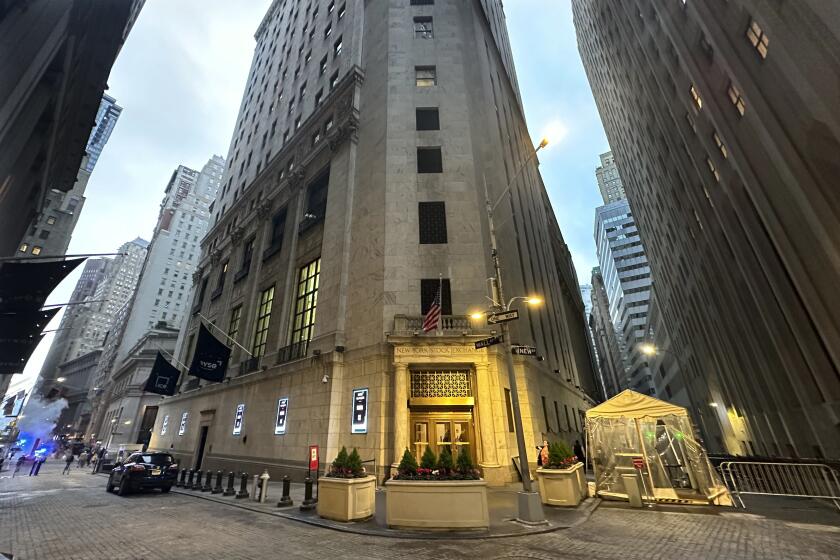Ports Are Slow to Make Dent in Backlog of Cargo
More than a week after a federal injunction forced the reopening of West Coast ports, the supply chain from Asia to the middle of America is still snarled badly enough to close factories, cause retailers to fret and drive truckers to despair.
Honda announced Friday that it was halting production at four Ohio plants for the weekend to allow parts to build up in the automaker’s supply line.
About 9,000 containers filled with holiday toys, lights and other goods are stuck on a dock in Ensenada, Mexico, where they were diverted at the start of the 10-day lockout, said Armando Freire, owner of San Diego-based Dimex Freight Systems.
The prospects of all the goods reaching stores shelves by the holidays are slim because only a few hundred containers are moving north a day in caravans guarded by the Mexican army, Freire said.
Meanwhile, more ships than ever are waiting to unload their cargos. “We’ve got over 122 outside today,” said Capt. Dick McKenna of the Marine Exchange, which monitors ship movements in the Los Angeles-Long Beach port complex. “Since the lockout ended, we’ve had 42 go out and 43 come in.”
Among the goods on those ships, according to truckers and logistics planners, are 10 containers full of Halloween candles and a load of disposable cameras meant to be handed out at the World Series.
“I suspect when this is all over you’ll see a lot of these products end up in the 99-cent stores,” said Dan Sanker, chief executive of CaseStack Logistics of Los Angeles, which handles product movement for small and medium manufacturers and suppliers. “That’s going to hurt some manufacturers significantly.”
With terminal yards jammed at the ports of Los Angeles and Long Beach, truckers who are paid by the haul are waiting for up to five hours to drop off or pick up containers, cutting their normal income by a third or more.
“Everybody’s holding on for now, because at least they’re working,” said Stephanie Williams, spokeswoman for the California Trucking Assn. “But pretty soon I think we’ll start seeing some bankruptcies.”
Eager to get transpacific shipping back to normal, many shipping lines have had vessels drop all U.S.-bound cargo at their first port of call, such as Los Angeles, rather take the containers on to final destinations in Oakland, Seattle or other ports that also are jammed.
The plan was to pick up those stranded containers on a later trip and drop them off at the other U.S. ports when the logjam eased. To accommodate the shipping lines, the U.S. Customs Service temporarily waived the 1920s-era Jones Act that prohibits foreign-flagged ships from picking up cargo at one U.S. port and delivering it to another one, said Vera Adams, Customs Service port director for Los Angeles and Long Beach.
The act was intended to protect the U.S. shipping industry from foreign competition. In reality, however, nearly all container vessels are now foreign flagged.
A week after granting the waiver, the Customs Service reconsidered and revoked it on Oct. 11, Adams said. By then, 19 vessels already had taken advantage of the waiver, she said.
International Longshore and Warehouse Union spokesman Steve Stallone called the waiver “one more example of government-employer collusion to solve the employers’ problems.”
The union maintains that the Bush administration favored the Pacific Maritime Assn. representing shipping lines and terminal operators when it invoked the Taft-Hartley Act to force the ports to reopen following the association’s lockout.
The two sides blame each other for the slow pace of recovery since the ports reopened Oct. 9.
The shipping group said the union was staging work slowdowns to gain leverage in contract talks, while the union said the slow pace was due to logistics problems and employer mismanagement.
The longshore union itself suffered a strategic blow Friday when the international presidents of four other unions announced to their members they could not support the ILWU in its contract fight because of territorial disputes.
The letter from presidents of the Machinists, Iron Workers, Operating Engineers and Seafarers unions, said the longshore union’s contract proposal “attempts to usurp and thwart the legitimate jurisdiction” of the four unions and would lead to a loss of jobs and membership. AFL-CIO Secretary-Treasurer Richard Trumka had attempted to head off the rare public confrontation a month ago, but the unions could not reach an agreement.
*
Associated Press was used in compiling this report.
*
RELATED STORY
Import issue: The trade deficit soars 10% to $38.5 billion. C2






